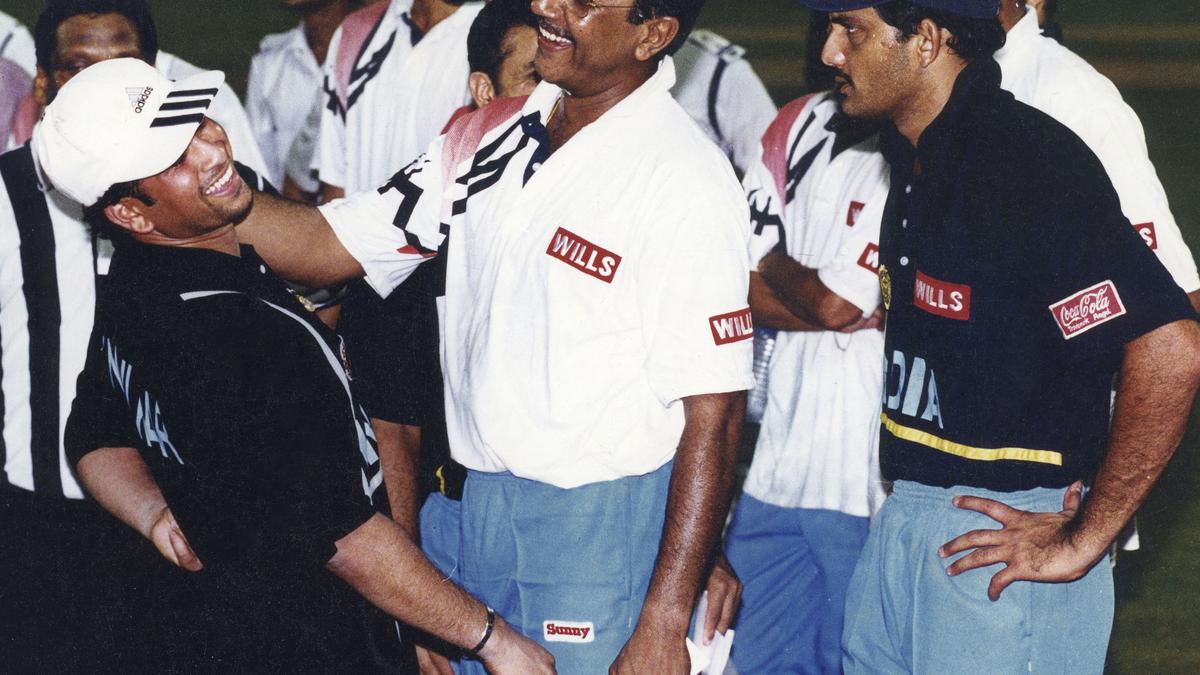
Review of Aditya Bhushan’s Guts amidst Bloodbath, The Aunshuman Gaekwad Narrative: True-blue opener
The Hindu
Aditya Bhushan's book ‘Guts amidst Bloodbath, The Aunshuman Gaekwad Narrative’ chronicles the life of cricketer Aunshuman Gaekwad. It details his grit against the West Indian fast bowlers, his links to royalty, and his multiple roles as coach, selector, and BCCI official. Gaekwad's own words, quotes from his team-mates, and anecdotes from his cricketing days bring the story to life. A tale of patience, dignity, and special friendships, this book captures the many shades that defined Gaekwad.
Opening in cricket, especially Tests, is never easy. The sight of fresh pace bowlers and a pitch that seems a mystery especially if it is the first day collectively triggers a tense state. Yet opening batters stride out quickly, sneak in a glance at the sky and do a close observation of the playing surface.
Openers are the cue cards that middle-order batters read before they emerge. Meanwhile, openers being the first one to face the firing squad are vulnerable and the 50-plus average that some middle order giants pocket remains elusive even if legends like Sunil Gavaskar prove to be an exception. Reliable openers often end up in the 40s or the 30s as far as averages go.
Seen in that light, Aunshuman Gaekwad was a solid opener, averaging just about 30 in the 40 Tests he turned out for India. The Baroda star also had to play musical chairs with Chetan Chauhan and K. Srikkanth while Gavaskar remained the eternal opener. Gaekwad’s doughty approach against the fearsome West Indian fast bowlers and the overall assurance he lent atop the batting tree had to be chronicled and Aditya Bhushan attempts that in Guts amidst Bloodbath, The Aunshuman Gaekwad Narrative. Interestingly, the cover also mentions Sachin Bajaj as having edited the tome, which is unique as usually those who fine tune a copy remain in the shadows.
The book starts with the gritty 81 that Gaekwad etched against a menacing Michael Holding and company at Kingston’s Sabina Park where most Indian batters including the opener were eventually hospitalised with ghastly injuries. This was Bodyline all over in 1976 and the blows that Gaekwad suffered have left their scars even now. Bhushan then pans into a flash-back of old Baroda where Gaekwad polished his cricket. His links to royalty, and also having a father Dattajirao Gaekwad, who led India briefly, are mentioned in detail.
Bhushan spices it up with quotes from his subject besides Gaekwad’s team-mates and even famous rivals like Holding and Vivian Richards. You get a sense of cricket in the old days when even basic issues like transportation between venues was a challenge. There is a lovely anecdote about Gaekwad hopping trains through the night just to play a match the next day. This may seem weird in these days of flights and business-class travel but the truth is former cricketers had it tough.
The book later dwells upon Gaekwad’s multiple roles as coach, selector and BCCI official. Towards the end, the first person singular pops up as Bhushan prises open the horse’s mouth. Gaekwad pens a chapter and the most evocative lines are: “I firmly believe that patience pays off and money does not matter always. The goodwill that one gains is invaluable.”
Like a true-blue opener quelling the initial fires before letting his middle-order mates prosper, Gaekwad’s has been a life of dignity and special friendships like the one he has with G.R. Viswanath. Bhushan has done well to capture the many shades that defined Gaekwad. He may not have stellar numbers but in all the roles he was assigned in Indian cricket, the tall bespectacled man left an indelible mark.











